Key takeaways:
- Budgeting in event management is a strategic skill that categorizes expenses into must-haves and nice-to-haves, ensuring essential elements are prioritized.
- A contingency fund is crucial for managing unexpected expenses, providing peace of mind during the planning process.
- Common budgeting techniques like line-item, program, and zero-based budgeting help clarify priorities and streamline expense management.
- Categorizing costs and reflecting on past experiences aids in making informed budgeting decisions that enhance attendee experiences.
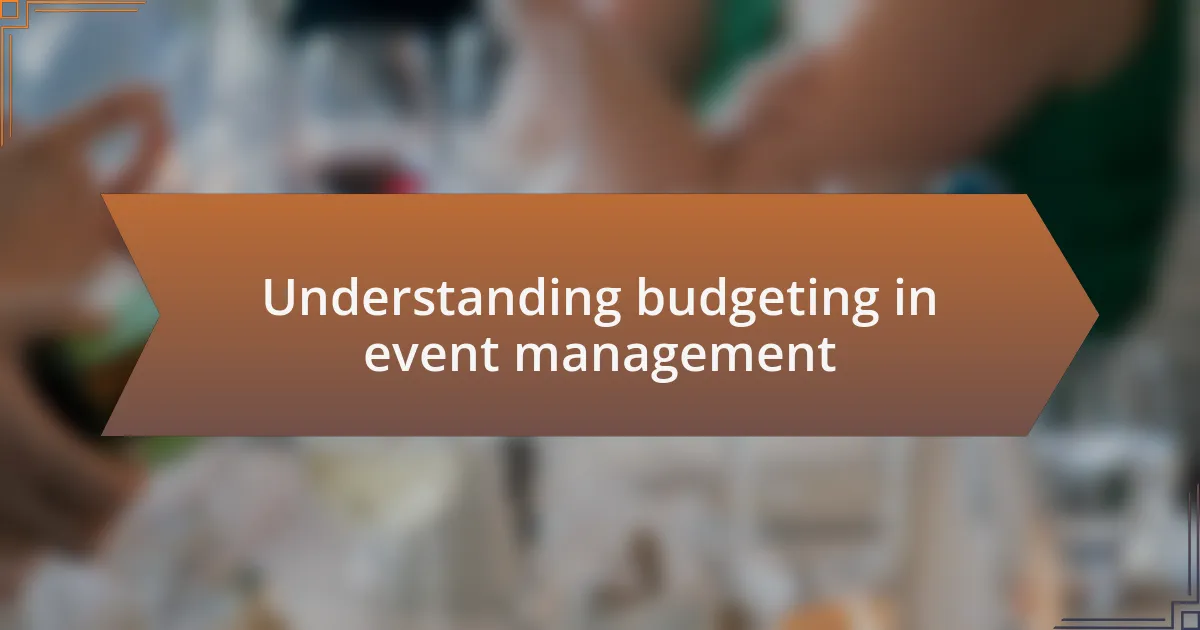
Understanding budgeting in event management
Budgeting in event management is a fundamental skill that I’ve learned is crucial for success. I remember the excitement of planning my first event, only to realize that without a solid budget, costs spiraled out of control. Have you ever found yourself in a similar situation, where your enthusiasm for an event was overshadowed by financial stress?
Understanding budgeting means recognizing that it isn’t just about numbers; it’s about strategy and prioritization. I often categorize expenses into must-haves and nice-to-haves, which helps me allocate resources effectively. This approach not only simplifies decision-making but also ensures I don’t miss out on essential elements that create a memorable experience for attendees.
Another insight I’ve gained is the importance of a contingency fund. Unexpected costs seem to lurk around every corner, waiting to surprise even the most meticulous planners. Have you ever dealt with an unforeseen expense that threw your budget into chaos? By setting aside a small percentage of the overall budget, I’ve been able to handle surprises with a level head, which brings peace of mind to the chaos of event planning.
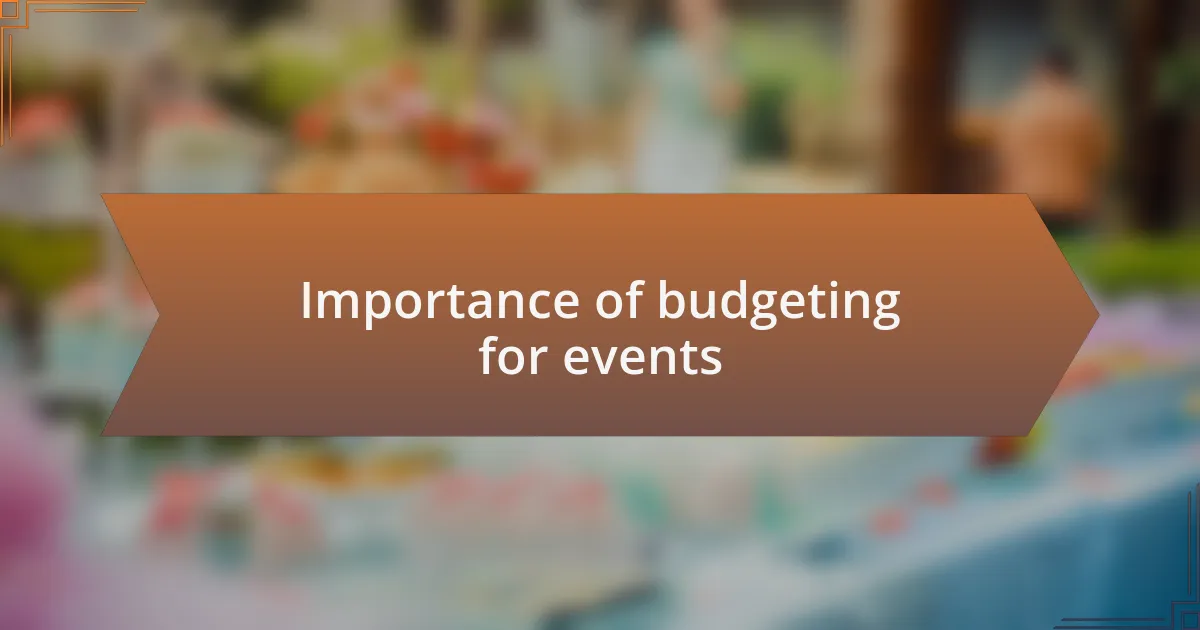
Importance of budgeting for events
When I think about the importance of budgeting for events, I realize it serves as the backbone of planning. A well-crafted budget provides a roadmap, guiding every decision from venue selection to catering options. Isn’t it a relief to have clear financial boundaries that keep the planning process focused and organized?
I’ve encountered instances where a lack of proper budgeting led to tough choices, like cutting back on entertainment or scrapping a meaningful detail altogether. This experience taught me that sticking to a budget not only protects my financial resources but also elevates the overall event quality. Wouldn’t you agree that a thoughtfully planned event can leave a lasting impression on your attendees?
Moreover, budgeting fosters accountability within a team. In a recent project, we appointed a budget manager who tracked every expense diligently. This transparency encouraged everyone to think creatively within our financial confines, ultimately resulting in innovative solutions that still aligned with our goals. Have you noticed how collaboration often flourishes when everyone understands the financial limits?
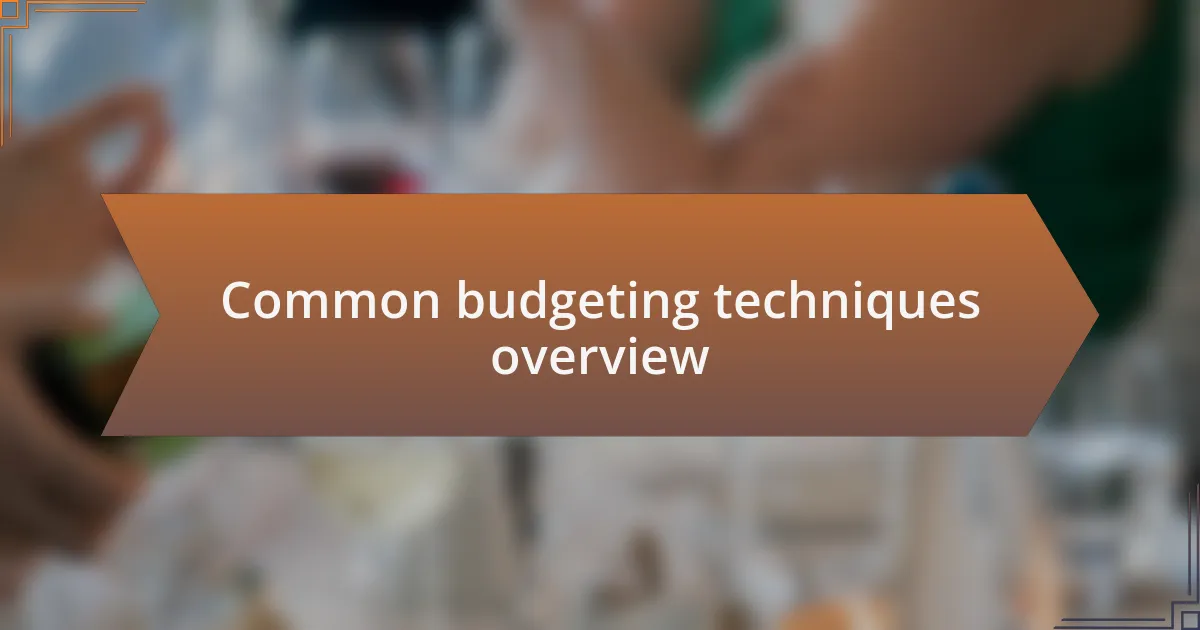
Common budgeting techniques overview
Budgeting techniques can significantly vary, but some of the most common ones are line-item budgeting, program budgeting, and zero-based budgeting. I’ve often found that line-item budgeting, which breaks down every expense into specific categories, helps me stay organized. It’s as if I’m piecing together a puzzle, where each piece contributes to the overall picture of the event.
On another occasion, I tried program budgeting, which groups costs by activities or objectives rather than individual items. This approach made me realize how aligning expenses with specific goals can clarify priorities. Have you ever thought about how categorizing your spending could reshape your focus on what truly matters for the event?
Zero-based budgeting brings a fresh perspective by starting from scratch each budgeting cycle, requiring justification for every expense. Although it initially felt daunting, this method encouraged me to question unnecessary costs and prioritize essential elements. Isn’t it remarkable how a different viewpoint can transform your budgeting strategy and enhance your event’s success?
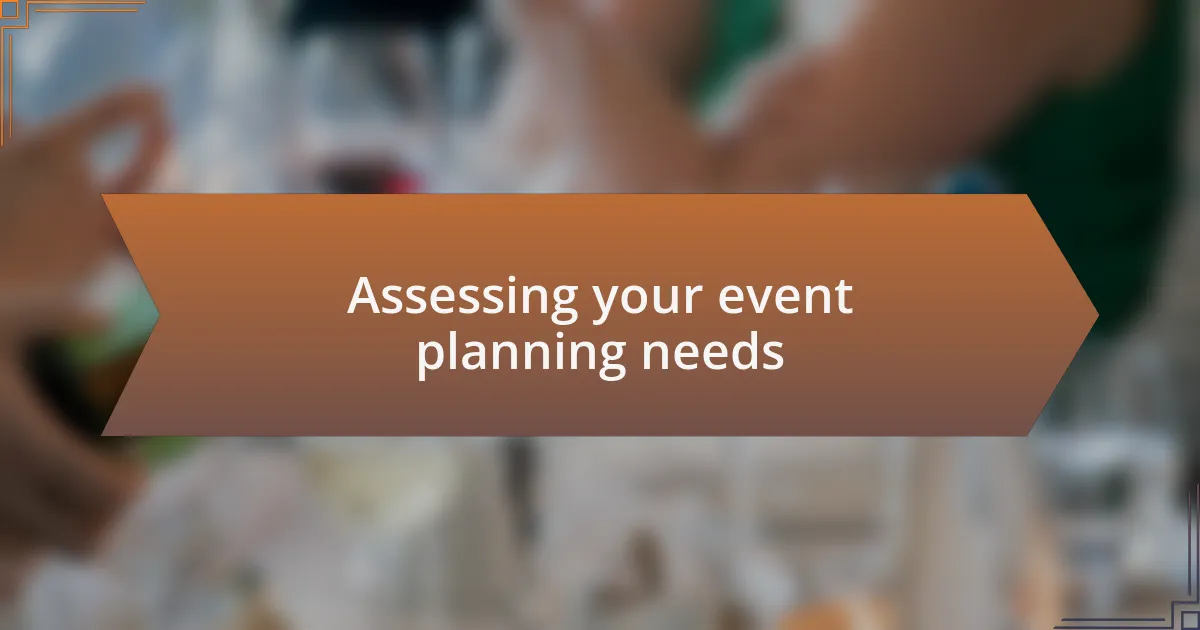
Assessing your event planning needs
When assessing my event planning needs, I’m always drawn to the impact of guest expectations. I remember a gala where I thought a lavish venue was necessary, but when I really considered the preferences of my attendees, a cozier setting with personal touches ended up being the highlight. This taught me that understanding your audience is vital in determining what elements deserve funding.
Another important factor is the scope and scale of the event. I once planned a small workshop that blossomed into an unexpected large seminar. My initial budget didn’t account for the additional materials needed for a bigger audience. Preparing to manage flexibility in your budget is essential. Have you ever underestimated the scale of your event? It can really shift your focus on how to allocate resources effectively.
Lastly, I always reflect on my past experiences to inform my decisions. There was a time when I approached budgeting too rigidly, focusing solely on numbers rather than values, and it led to a lackluster event. Now, I strive to balance budget constraints with the experience I want to create. Realizing that each dollar spent adds to the overall experience allows me to prioritize what truly enhances the event. What insights have you gained about your own budgeting needs through past events?
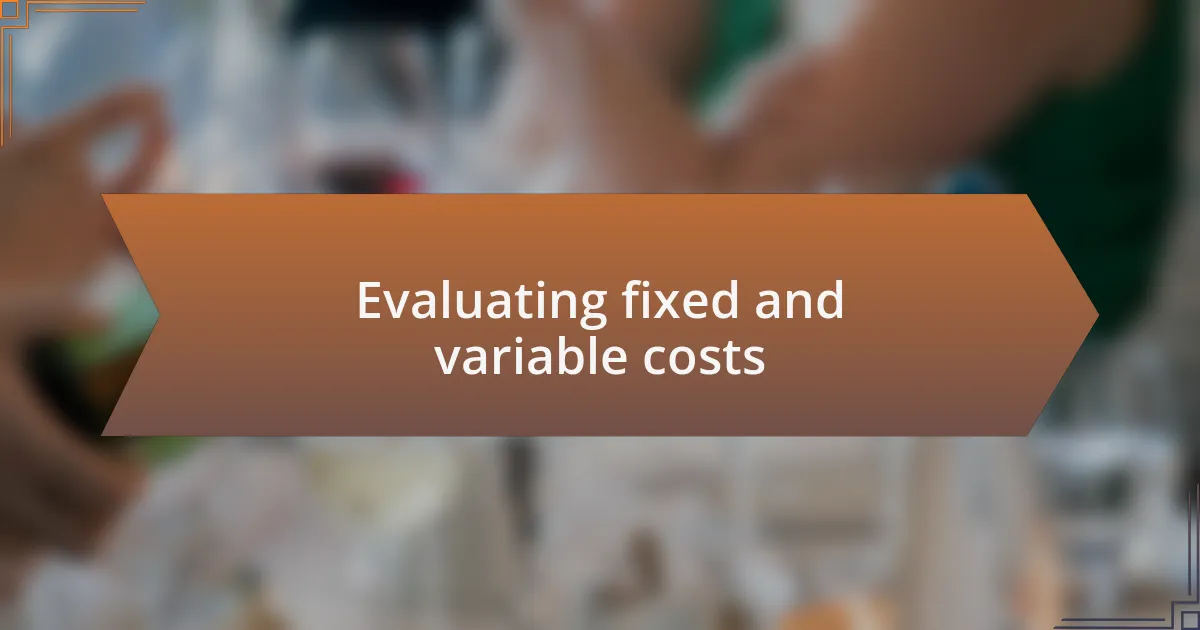
Evaluating fixed and variable costs
When evaluating fixed and variable costs, I often find myself reflecting on how these elements can drastically shape the budget. Fixed costs, like venue rental or equipment fees, remain constant regardless of attendance. I recall a corporate event where the venue cost was substantial, and despite the savings I anticipated from fewer attendees, those fixed expenses loomed large and impacted my overall financial flexibility. Have you faced a similar dilemma, where fixed costs felt like a heavy anchor on your budget?
On the other hand, variable costs can fluctuate dramatically based on choices and attendee levels. For instance, at a conference I organized, catering expenses surged because of last-minute RSVPs. It’s a reminder that as attendance changes, so too does your overall financial layout. I always consider how I can manage these costs by strategizing on elements like food options or materials – does a buffet style truly suit your guests’ preferences, or would a plated meal be both elegant and manageable?
In my experience, assessing both fixed and variable costs is not just about crunching numbers; it’s about understanding their implications on the event’s experience. For example, while I initially thought splurging on decor was a must, analyzing the overall budget led me to prioritize guest engagement activities instead. This shift in perspective often results in a deeper understanding of how each expenditure contributes to creating memorable moments. What has your evaluation of these costs revealed about your own event planning priorities?
![]()
Tips for effective budget tracking
Tracking a budget effectively requires diligence and consistency. I remember during one particularly large event, I set up a simple spreadsheet that I updated daily. Not only did it keep me on top of expenses, but it also helped me feel in control, a feeling that can easily slip away during the busy planning stages. Have you ever felt overwhelmed trying to juggle receipts and bills? A daily check-in can really ease that stress.
Another technique that has worked wonders for me is categorizing expenses into clear sections, such as essentials versus nice-to-haves. I found this especially useful when planning a charity gala, where every dollar spent could either enhance the attendee experience or diminish potential donations. By clearly labeling costs, I’ve been able to pivot my spending as needed; it’s a little like being a chef picking between ingredients for a dish—some are essential, while others can elevate the entire meal. How do you prioritize your spending when faced with tough choices?
Lastly, regularly revisiting your budget is crucial. I make it a point to review my financial plan with my team midway through the planning process. There have been instances where we discovered unexpected savings or unanticipated expenses that required our immediate attention. It’s like adjusting your sails when the wind shifts; staying adaptable is key. Have you had moments where minor tweaks to your budget led to significant improvements? Recognizing these adjustments can transform the overall success of your event.